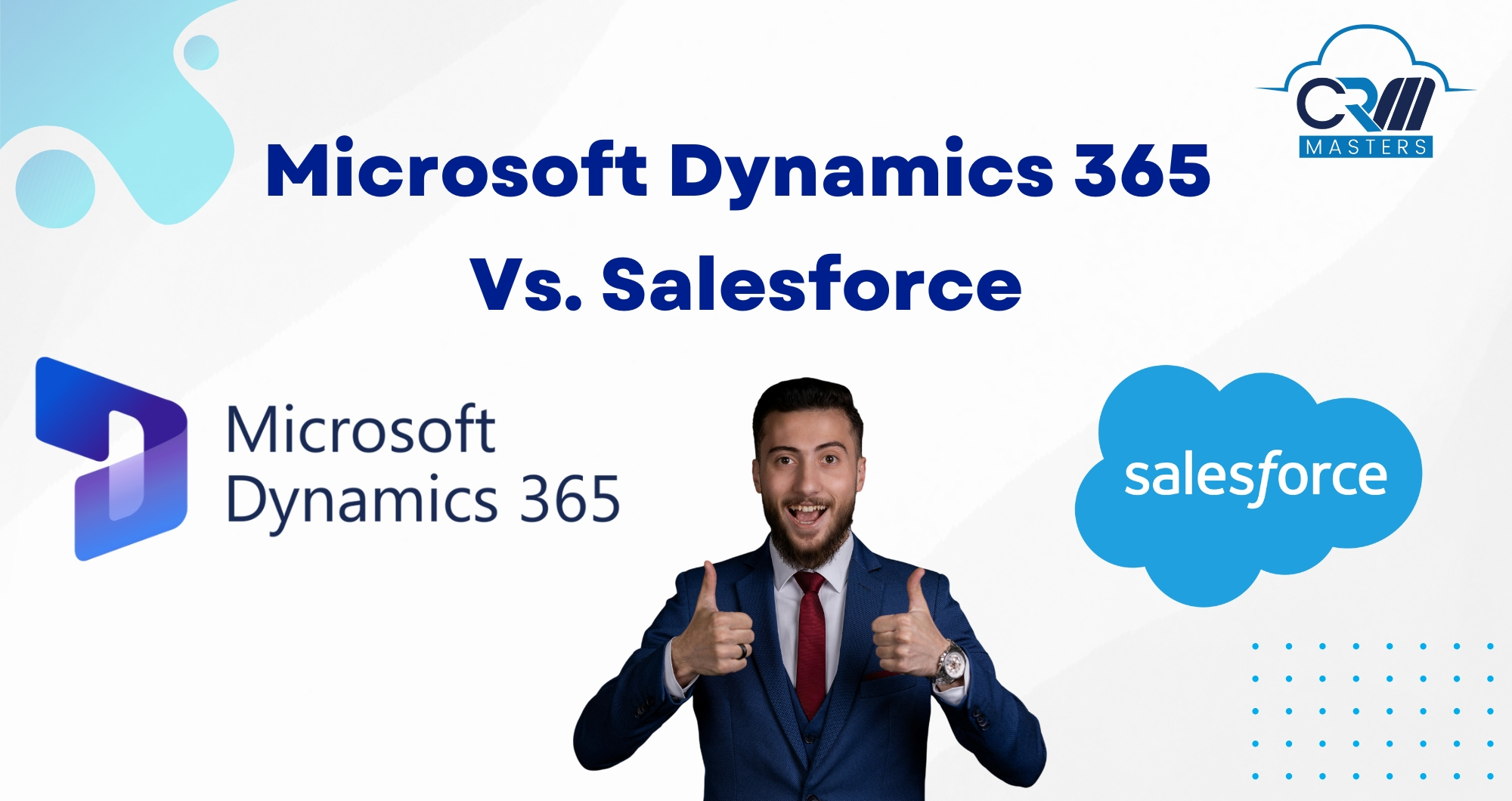
Microsoft Dynamics 365 Vs. Salesforce
Thinking about implementing a CRM for your business? It’s a game-changing decision that can improve customer relationships, streamline processes, and drive growth. But with so many CRM options available, how do you know which one is the best fit?
Every business has unique needs, and finding the right CRM means choosing a solution that aligns with your goals. While there are plenty of options customised to different industries and company sizes, if you’re looking for a reliable, feature-rich platform, starting with the market leaders is a smart move.
CRM technology has come a long way since its introduction in the 1970s, and today, Salesforce and Microsoft Dynamics 365 stand out as two of the most trusted names in the industry. Many businesses choose to work with a Salesforce Implementation Partner to ensure a smooth and successful CRM setup.
Both platforms offer powerful features and years of expertise—but which one suits your business better?
In this blog, we’ll compare these two CRM giants to help you decide which platform can best meet your business needs.
Salesforce or Microsoft Dynamics 365?

Salesforce has been the most popular CRM software for a long time, leading the market with its advanced features. But now, Microsoft Dynamics 365 is catching up, becoming a strong competitor. While Salesforce still has a larger market share, Dynamics 365 is quickly gaining ground and proving to be a reliable alternative for businesses looking for an efficient CRM platform.
Most CRM platforms offer basic features like managing customer data, tracking sales, providing customer support, and generating reports. However, Salesforce and Microsoft Dynamics 365 stand out because they offer much more than these essential functions. Both platforms provide a wide range of tools that address various business needs, making them more than just typical CRMs.
Salesforce offers a highly customizable platform with advanced automation, AI-powered insights, and seamless third-party integrations. On the other hand, Microsoft Dynamics 365 leverages its integration with other Microsoft products, offering a unified ecosystem that enhances productivity and collaboration. These added capabilities allow businesses to streamline operations, improve decision-making, and enhance customer engagement on a deeper level.
As Microsoft Dynamics 365 improves its features and expands its user base, it is becoming a strong option in the CRM market. This competition is great for businesses, giving them two powerful solutions to choose from—each with its own strengths and unique benefits.
Salesforce vs. Microsoft Dynamics 365: A Detailed Feature Comparison
When it comes to choosing between Salesforce and Microsoft Dynamics 365, both platforms offer powerful CRM features that go beyond managing customer relationships. While their core capabilities are similar, the right choice depends on your business’s priorities and needs.
Here’s a detailed breakdown of how these two CRM giants compare across key areas:
1. Lead and Pipeline Management
Microsoft Dynamics 365 and Salesforce both excel at helping businesses manage leads, track customer journeys, and convert prospects into loyal customers. However, the way they handle lead scoring, pipeline management, and advanced features differs slightly.
-
Microsoft Dynamics 365
Defines leads and opportunities separately to help users better manage their sales pipeline. Leads represent individuals who have shown initial interest (such as filling out a form), while opportunities reflect a more advanced stage with defined budgets and timelines.
Drag-and-drop functionality allows users to move leads through various stages, and team leaders can route opportunities to the right sales reps.
Add-ons like Microsoft Copilot provide AI-driven recommendations and content creation to enhance pipeline management.
-
Salesforce
Similar lead and opportunity definitions as Dynamics 365, with seamless lead tracking and pipeline management.
Drag-and-drop tools allow sales teams to organize leads, move contacts between sales stages, and customize sales metrics.
Upgrading to Salesforce Einstein unlocks full pipeline automation, with AI-powered insights, recommendations, and generative AI assistance.
Additional tools like partner management help larger organizations track outsourced operations, while performance management tools allow sales leaders to monitor teams and reward achievements.
2. Product Usability
Both platforms come loaded with features, making them powerful but sometimes overwhelming for new users.
-
Microsoft Dynamics 365
The interface feels familiar to users of Office 365 and Outlook, offering a seamless experience for those already in the Microsoft ecosystem.
Drag-and-drop customization tools make it easy to modify the layout without coding.
Despite its clean design, the wide range of features can create a steep learning curve, often requiring assistance from consultants for the best Microsoft Dynamics 365 Consulting Services to optimize CRM workflows.
Add-ons like Power Automate simplify processes, improving ease of use over time.
-
Salesforce
Sales Cloud features a clean, intuitive interface with easy navigation and drag-and-drop editing features.
Despite its user-friendly design, the complexity of its tools may require help from a Salesforce Consulting Partner to ensure proper setup and use.
Trailhead—Salesforce’s online learning platform—offers self-paced courses that help users quickly grasp the platform’s capabilities.
3. AI and Automation
AI and automation play a critical role in enhancing CRM performance by minimizing manual tasks and providing valuable insights.
-
Microsoft Dynamics 365
Basic automation features cover lead, contact, and opportunity management.
Advanced sales force automation includes AI-assisted sales forecasting and action tracking, but these features are available only on higher-tier plans.
Power Automate (a separately licensed product) enables the automation of complex business processes, while Microsoft Copilot adds generative AI capabilities to Outlook and Teams.
-
Salesforce
Einstein Activity Capture (included in all plans) automatically syncs data like emails and calendar entries, eliminating the need for manual activity logging.
Higher-tier plans unlock advanced tools like Einstein Copilot, which uses generative AI to analyze data and provide actionable insights.
Flow Builder offers a point-and-click interface to automate everyday tasks, improving efficiency.
4. Analytics and Reporting
Analyzing sales data and performance metrics is crucial for making informed business decisions.
-
Microsoft Dynamics 365
Comes with pre-built interactive sales dashboards that offer real-time insights into sales performance and team activities.
Standard dashboards include:
- Sales Manager Summary: Performance tracking, open opportunities, and revenue metrics.
- Sales Professional Summary: Daily sales numbers, active accounts, and open opportunities.
- Sales Multi-Stream Dashboard: Open opportunities, activities, and phone calls.
Data can be exported to Excel as static or dynamic worksheets for further analysis.
Integration with Microsoft Power BI allows users to visualize data and generate customized reports.
-
Salesforce
Offers pre-built, customizable reports and dashboard templates through AppExchange, allowing teams to view performance metrics and drill down into detailed insights.
Standard dashboards include:
- Executive Sponsor Dashboard: Tracks FYTD revenue, opportunities, and key accounts.
- Key Performance Indicators Dashboard: Monitors opportunity win rates, average deal size, and pipeline health.
- Sales Manager Dashboard: Displays team revenue, opportunity pipeline, and sales leaderboards.
Advanced features such as history tracking and cross-filtering require higher-tier plans.
5. AI-Powered Customer Support
Given the complexity of both platforms, expert support is often essential.
-
Microsoft Dynamics 365
Users can access a comprehensive documentation library, community forums, and tutorial videos.
Microsoft offers three levels of support:
- Standard: For businesses with basic needs.
- Professional Direct: Faster response times and expert access.
- Unified Enterprise: End-to-end support across multiple Microsoft products.
-
Salesforce
Users have access to extensive resources through the Salesforce Help Center and Trailhead for self-learning.
Paid Success Plans offer tailored support:
- Standard Success Plan: 24/7 technical support and on-demand resources.
- Premier Success Plan: Direct access to technical experts and personalized guidance.
Which CRM is Right for You?
The choice between Salesforce and Microsoft Dynamics 365 ultimately depends on your business size, industry, and long-term goals. While Salesforce offers a more intuitive experience and extensive customization options, Microsoft Dynamics 365 integrates deeply with Microsoft’s suite of products, making it an excellent choice for companies already invested in that ecosystem.
By understanding their differences and weighing their strengths, you’ll be better equipped to choose the CRM that best fits your business needs.
Ready to Choose the Right CRM for Your Business?
Deciding between Salesforce and Microsoft Dynamics 365 can be challenging, especially when both platforms offer robust features and unique benefits. If you’re unsure which CRM best suits your business goals, CRM Masters is here to help! Our team of 100+ experts can analyze your business size, industry, and requirements to recommend the most suitable platform for your needs.
Still not sure? Contact our product experts today for a Free Consultation Call!












